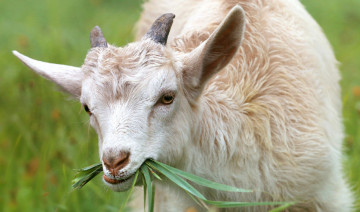{article.name}
Stay Informed
Tips to Boost Goat Parasite Control

- Share this:
- Share on Facebook
- Pin on Pinterest
- Tweet on Twitter
Goats can be profitable additions to any farm or urban homestead, but parasites can dramatically reduce any goat’s productivity. Fortunately, there are many ways to boost goat parasite control to improve the health and production of any herd of goats.
About Goat Parasites
Small ruminants like goats are susceptible to a wide range of internal and external parasites. A variety of internal worms can affect a goat’s productivity, while external pests like flies and lice can also be a problem. A small amount of parasites are normal, both inside and out, but if a goat’s parasite load becomes unbalanced and the parasite populations grow out of control, the goat can suffer.
A parasite-ridden goat may have many difficulties, including less successful breeding, weight loss that reduces meat, or loss of milk production. Goats with too many parasites may have symptoms such as diarrhea, anemia, appetite loss, listlessness, or edema under the jaw, also known as bottle jaw. Different types of goats are susceptible to different types of parasites depending on the goat’s breed, age, and overall health, and some parasites are more prevalent in different types of pastures, at different times of year, or in different climates.
Boosting Goat Parasite Control
No matter which parasites may be bothering goats the most, the same control methods are often effective. While it is best to consult a veterinarian for a diagnosis about the exact parasites, these steps can help control most parasites to keep goats healthy and thriving.
- Rest the Pasture – An over-grazed pasture will have more feces in the soil, and therefore a higher parasite load to infect goats. Ideally, resting the pasture at least 60 days between when it is grazed by goats or sheep – which share many parasite difficulties – can help boost parasite control.
- Till, Burn, or Harvest the Pasture – If the pasture is tilled, burned, or harvested for hay between grazings, it is less likely to harbor an overload of parasites. These are all natural and easy ways to minimize parasites in the pasture between when it will be grazed.
- Plant Taller Forage – Because most parasite worms can only climb 2-3 inches onto wet blades of grass, growing taller forage in the pasture will allow goats to graze at a better height where they won’t ingest as many parasites.
- Plant Tannin-Producing Forage – Plants that produce tannin are less hospitable to parasites and can help keep a goat herd healthier. Plants such as birdsfoot trefoil, chicory, crown vetch, and sainfoin are ideal choices for high-tanin forage.
- Rotate Pasture Animals – Because horses and cattle do not harbor the same parasites as goats and sheep, alternating which animals are in which pasture will help keep parasite loads more manageable so no species is overwhelmed with parasites.
- Keep Fewer Animals in Each Pasture – If fewer animals are grazing in one part of the pasture, there will be less feces and fewer parasites to cause problems. Ideally, there should only be 8-10 goats per acre of pasture.
- Follow a Deworming Schedule – If particular parasites are recurring among a goat herd, a regular deworming schedule can provide better control. Deworming must be done carefully, however, preferably under veterinary supervision, or else the parasites can become resistant to chemical treatments. Rotating deworming treatments can minimize resistance.
- Spraying and Dusting – Using sprays or dusts over the pasture can help control external parasites such as lice, mites, ticks, fleas, and flies. As with deworming treatments, however, these chemical treatments must be done carefully to minimize pest resistance.
- Provide Good Nutrition – Goats that have a healthy, nutritious diet will naturally be more resistant to all types of pests. Providing goats with good quality forage and appropriate supplements, including necessary minerals, can help with their natural parasite control.
- Monitor the Herd – Staying alert to the herd’s overall condition will help make any potential parasite problems more noticeable. The sooner a parasite infestation is noticed, the more easily it can be treated and controlled.
Parasites are a natural part of a goat’s digestive tract, but an overload of parasites can cause many different problems. Fortunately, there are a number of easy ways to boost goat parasite control and provide healthy, safe pastures for goats to thrive. It is best to use multiple techniques and to adjust options whenever needed to keep the herd as healthy as possible and to maximize each individual goat’s productivity.
Special Offers
We are constantly adding new specials to our site. Be sure to check back often!

Comments